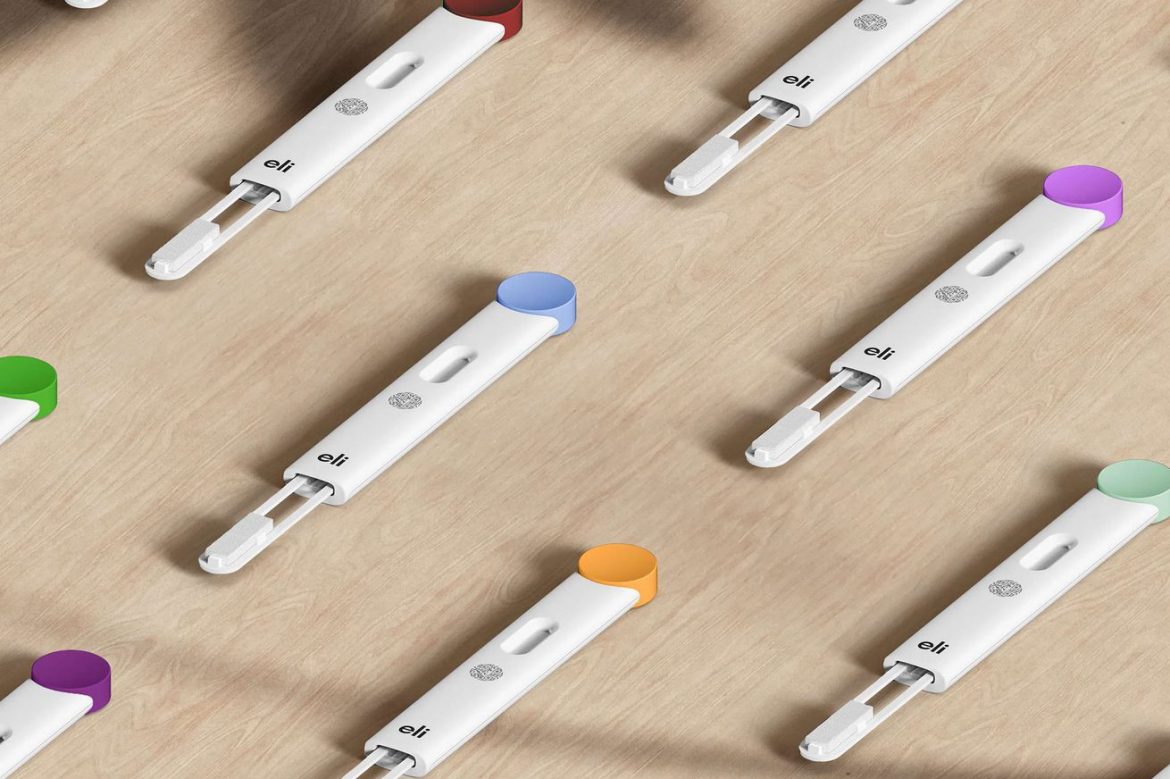The Hormometer is meant to be a one-step at-home test for cortisol and progesterone levels. | Image: Eli Health
If you’re health-conscious, chances are your feed for the past year has been flooded with influencers evangelizing hormone balancing as a hack for easy weight loss, lowering stress levels, and even reversing symptoms of hormonal conditions like polycystic ovary syndrome (PCOS). So it’s not at all surprising to see Eli Health announce Hormometer, an at-home hormone-testing system that uses your spit and your smartphone’s camera to measure hormone levels.
Like many at-home tests, Hormometer requires you to take a sample of bodily fluid. In this case, it’s saliva. It consists of a thin cartridge that you stick in your mouth for 60 seconds. It looks similar to a pregnancy test, with a window where you can view results. Once collected, the Eli app uses your phone’s camera to assess the test’s results based on criteria like color intensity and sample patterns. Depending on the test and results, Eli Health says the app will then provide personalized trends and recommendations related to stress, sleep, athletic performance, and fertility.
To start, Eli Health says it’s offering two types of hormone tests: cortisol and progesterone. Cortisol is commonly known as the stress hormone and plays a critical role in regulating fight or flight response, blood pressure, blood sugar, metabolism, and sleep cycles. Long-term imbalances, both high and low, are often linked with negative health outcomes including Cushing’s syndrome, unintentional weight gain / loss, fatigue, Type 2 diabetes, and abnormal blood pressure. Meanwhile, progesterone is a reproductive hormone. Abnormal levels can result in irregular periods, fertility problems, and depression.
Image: Eli Health
The tests don’t require you to mail in samples. You can just use your phone to get results.
Eli Health’s tests are a reflection of recent health and wellness trends. Connected at-home testing kits, for example, saw a rise in popularity at the height of the covid-19 pandemic. Though expensive, smart over-the-counter PCR tests like Cue Health became a major part of some tech companies’ return-to-office plans, thanks to their convenience and accuracy.
Similarly, a big part of Hormometer’s appeal is its portability and accessibility. Traditionally, hormone tests have to be sent to a lab and are often taken at a doctor’s office. That can take several days or weeks. They can also be messy if they’re urine-based or invasive if blood-based. The advantage of this type of test is it doesn’t require another party and can turn around results more quickly. As far as cost, Eli Health says Hormometer will come with a subscription plan, starting at $8 monthly with a 12-month commitment. That’s competitive with other at-home hormone tests, which can range from roughly $30 to $250 and require people to mail in samples.
Meanwhile, balancing hormone levels, particularly cortisol, has become a viral wellness trend. Tips to fix “cortisol face,” for example, ran rampant on TikTok throughout 2024. However, experts have decried hormone balancing as both misleading and potentially harmful — hormones can’t truly be balanced, as they’re dynamic and naturally ebb and flow throughout the day. That said, these tests could help people with official diagnoses of chronic hormonal or reproductive health issues monitor their conditions.
A lot of that will depend on accuracy. According to Eli Health, the Hormometer is FDA registered. To be clear, this is different than clearance or approval. It doesn’t mean the FDA has reviewed or cosigned Eli Health’s claims. That said, the company claims that its cortisol and progesterone tests had a 97 percent and 94 percent agreement with gold-standard, FDA-approved lab tests in third-party testing, respectively.
Eli Health says Hormometer will begin beta access this month in the US and Canada. A full release is expected later this year. And while Hormometer is currently limited to cortisol and progesterone, the company says it’s already developing testosterone and estradiol tests for the future.

